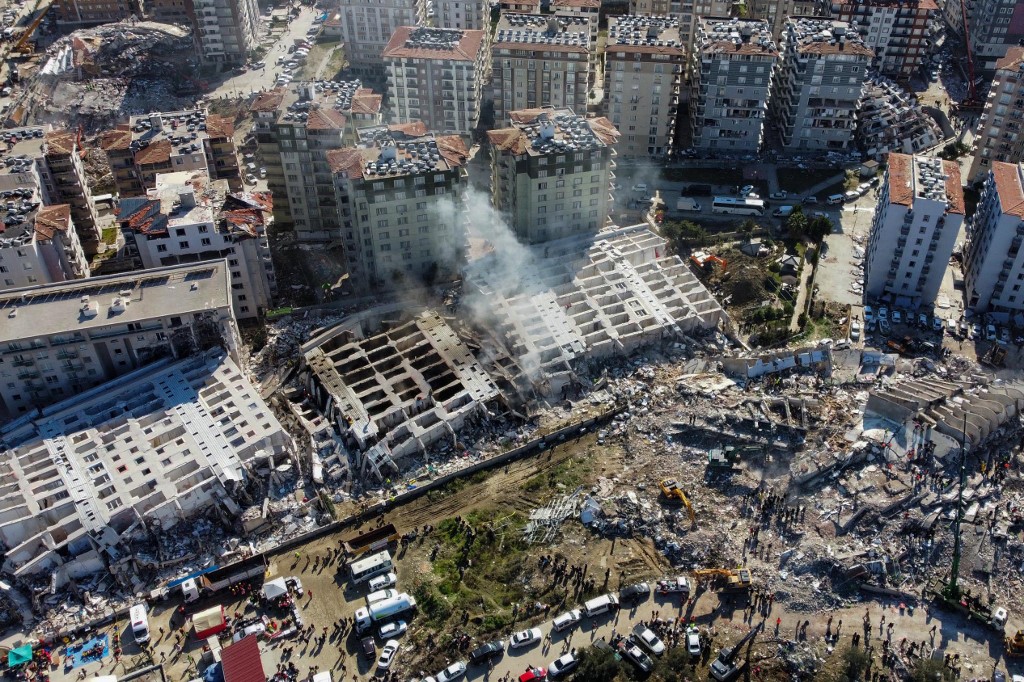A strong earthquake struck southeastern Turkey and neighboring Syria in the early hours of Monday, devastating cities and killing and injuring thousands.
Here’s what we know about the disaster so far:
When and where
The first 7.8 magnitude quake occurred at 04:17 am (0117 GMT) at a depth of about 18 kilometers (11 miles) near the Turkish city of Gaziantep, which is home to around two million people, the US Geological Survey said.
It was followed by a slightly smaller 7.5 magnitude tremor and many aftershocks.
The quakes devastated entire sections of major cities in Turkey and war-ravaged Syria.
The region also hosts millions of people who have fled the civil war in Syria and other conflicts.
Casualties
Nearly 20,000 people have been killed and thousands more injured as efforts continue for a fourth day in freezing conditions to save those still trapped under rubble.
Officials and medics said Thursday that 16,170 people had died in Turkey and 3,162 in Syria, bringing the confirmed total to 19,332.
Initial rescue efforts were hampered by a winter storm that covered major roads in ice and snow and left three key airports in the area inoperable, complicating deliveries of vital aid.
Survivors are still being pulled from collapsed buildings, though disaster experts warn that the chances of saving lives drop sharply after 72 hours.
Destruction
Some of the heaviest devastation occurred near the quake’s epicenter between Kahramanmaras and Gaziantep, where entire city blocks lay in ruins.
Turkey said almost 3,000 buildings had collapsed in seven different provinces, including public hospitals.
A famous mosque dating back to the 13th century partially collapsed in the province of Maltaya, where a 14-story building with 28 apartments that housed 92 people collapsed.
Social media posts showed a 2,200-year-old hilltop castle built by Roman armies in Gaziantep lying in ruins, its walls partially turned to rubble.
In Syria, the health ministry reported damage across the provinces of Aleppo, Latakia, Hama and Tartus, where Russia is leasing a naval facility.
The UN’s cultural body, UNESCO warned that two sites on its World Heritage List, the old city of Syria’s Aleppo and the fortress in the southeastern Turkish city of Diyarbakır, had sustained damage and that several others may also have been hit.
It noted that the quake occurred in one of the longest continuously inhabited areas on the planet within the so-called Fertile Crescent, which has witnessed the emergence of different civilizations from the Hittites to the Ottomans.
Even before the tragedy, buildings in Aleppo often toppled due to poor infrastructure and many are dilapidated after more than a decade of war.
Ratings agency Fitch said the quake could cause economic losses exceeding $4 billion. Insured losses will be much lower, possibly around $1 billion, due to low insurance coverage in the area, it added.
International aid
Condolences and offers of aid have poured in, including from the European Union, the United Nations, NATO, Washington, China and Russia.
EU chief Ursula von der Leyen said the bloc is planning to host a donor conference in March.
President Joe Biden promised his Turkish counterpart Recep Tayyip Erdoğan that the United States will send “any and all” aid needed.
US Secretary of State Antony Blinken said Washington would work with partners to provide aid in Syria, instead of with the government of President Bashar al-Assad, which is under Western sanctions over alleged humanitarian abuses during his country’s nearly 12-year civil war.
Syria, which has only been offered minimal assistance because of the sanctions, on Wednesday made an official plea to the EU for help.
An aid convoy reached rebel-held northwestern Syria Thursday, the first since the earthquake, an official at the Bab al-Hawa border crossing told AFP.
France meanwhile pledged 12 million euros (almost $13 million) in emergency aid to Syria.
The UN’s resident Syria coordinator, El-Mostafa Benlamlih, called for the facilitation of aid access to rebel-held areas in Syria’s northwest, warning that relief stocks will soon be depleted.
The European Commission is “encouraging” EU member countries to respond to Syria’s request for medical supplies and food, said the commissioner, Janez Lenarcic.
The World Health Organization said up to 23 million people could be affected by the earthquake and promised long-term assistance.
WHO chief Tedros Adhanom Ghebreyesus said 77 national and 13 international emergency medical teams were deployed to the affected areas.


